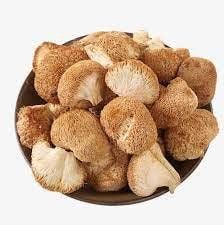Lion's mane mushroom (also known as lion's mane or yamabushitake) is a large, white, shaggy mushroom that resembles a lion's mane. It can be eaten raw, cooked, dried, or steeped as a tea. Its extract is used for dietary supplements. It tastes like seafood (crab or lobster) and contains many bioactive compounds that have beneficial effects on the body, especially the brain, heart, and intestines.
1. 9 Health Benefits of Lion's Mane Mushrooms and Extracts
1.1 Could protect against Dementia
The brain’s ability to grow and form new connections typically declines with age, which may explain why mental functioning worsens in many older adults. Studies have found that lion’s mane mushrooms contain two special compounds that can stimulate the growth of brain cells: hericenones and erinacines.
Additionally, animal studies have found that lion’s mane may help protect against Alzheimer’s disease, a degenerative brain disease that causes progressive memory loss.
In fact, lion’s mane mushroom and its extracts have been shown to reduce symptoms of memory loss in mice, as well as prevent neuronal damage caused by amyloid-beta plaques, which accumulate in the brain during Alzheimer’s disease.
A study in older adults with cognitive impairment found that consuming 3 grams of lion’s mane powder daily for 4 months significantly improved mental function. However, these benefits disappeared immediately with continued lion’s mane supplementation. Thus, it provides neurogenesis and protection against the damage associated with Alzheimer’s disease.
However, it’s important to note that most of the research has been conducted on animals or in test tubes. Therefore, more human studies are needed.
1.2 Helps Reduce Mild Symptoms of Depression and Anxiety
Up to 30% of people living in developing countries experience symptoms of anxiety and depression.
While there are many causes of anxiety and depression, chronic inflammation may be a major contributing factor.
Animal studies have found that lion's mane mushroom extract has anti-inflammatory effects that may reduce symptoms of anxiety and depression in mice.
Other animal studies have found that lion's mane mushroom extract may also help regenerate brain cells and improve the function of the hippocampus, a region of the brain that processes memories and emotional responses.
Researchers believe that improved hippocampal function may explain the reduction in anxious and depressive behaviors in mice given these extracts.
While these animal studies are promising, there is little research involving humans.
A small study of menopausal women found that eating cookies containing lion's mane mushrooms daily for 1 month reduced self-reported feelings of irritability and anxiety.

1.3 Speeds up recovery from nerve injuries
The human nervous system consists of the brain, spinal cord, and nerves that travel throughout the body. They work together to send and transmit signals that control almost every function in the body. Damage to the brain or spinal cord can cause paralysis or loss of mental function, which takes a long time to recover.
However, research has found that lion's mane mushroom extract can help speed up recovery from nerve injuries by stimulating the growth and repair of nerve cells. In fact, lion's mane mushroom extract has been shown to reduce recovery time by 23-41% in mice with neurological injuries.
In addition, lion's mane mushroom extract may also reduce the severity of brain damage after stroke. In one study, administering high doses of lion's mane mushroom extract to mice immediately after a stroke reduced inflammation and reduced the size of stroke-related brain injuries by 44%. However, no human studies have been conducted to evaluate this effect of lion's mane mushroom.
1.4 Fights Gastrointestinal Ulcers
Ulcers can form anywhere along the digestive tract, including the stomach, small intestine, and large intestine.
The two main factors that commonly cause stomach ulcers are an overgrowth of the bacteria H. pylori and damage to the stomach lining, often caused by long-term use of nonsteroidal anti-inflammatory drugs (NSAIDs).
Lion's mane extract may protect against the development of stomach ulcers by inhibiting the growth of H. pylori and protecting the stomach lining from damage.
Some older studies have found that lion's mane extract can prevent the growth of H. pylori in test tubes, but no studies have examined whether the extract has the same effect inside the stomach.
Another animal study found that lion’s mane extract was more effective at preventing alcohol-induced stomach ulcers than common acid-reducing drugs—and without any negative side effects.
Lion’s mane extracts may also reduce inflammation and prevent tissue damage in other areas of the gut. In fact, they may help treat inflammatory bowel diseases like ulcerative colitis and Crohn’s disease
A study of people with ulcerative colitis found that taking a mushroom supplement containing 14 percent lion’s mane extract significantly reduced symptoms and improved quality of life after 3 weeks.
Overall, the research suggests that lion’s mane extract may help inhibit the development of ulcers, but more human studies are needed.

1.5 Reduce the risk of cardiovascular disease
Factors that increase the risk of heart disease include: Obesity, high triglycerides, high levels of oxidized cholesterol, and an increased tendency to form blood clots. Research shows that lion's mane extract can affect these factors, thereby reducing the risk of heart disease.
Studies in mice have found that lion's mane extract improves fat metabolism and reduces triglyceride levels. Since obesity and high triglycerides are risk factors for heart disease, this is one way to explain why lion's mane mushrooms are good for heart health.
Test-tube studies have also found that lion's mane mushroom extract can prevent the oxidation of cholesterol in the blood. In fact, oxidized cholesterol molecules tend to attach to artery walls, causing them to harden, increasing the risk of heart attack and stroke. Therefore, lion's mane mushrooms' ability to reduce cholesterol oxidation is also beneficial for heart health.
In addition, lion's mane mushrooms also contain the compound hericenone B - which has the effect of slowing blood clotting, reducing the risk of heart attack and stroke. However, more research is needed on this effect of lion's mane mushrooms.
1.6 Controlling the symptoms of diabetes
Diabetes is a disease that occurs when the body loses the ability to control blood sugar levels. And as a result, blood sugar levels increase. Chronic high blood sugar can cause complications such as: Kidney disease, nerve damage in the hands and feet, vision loss, etc. Lion's mane mushroom is beneficial for controlling diabetes because it helps control blood sugar levels, reducing some complications of the disease.
Some animal studies have shown that lion's mane mushroom can lower blood sugar levels in mice (both healthy mice and diabetic mice). This is because it blocks the activity of the enzyme alpha-glucosidase - an enzyme that breaks down carbs in the small intestine. When this enzyme is blocked, the body cannot digest and absorb carbs effectively, resulting in lower blood sugar levels.
In addition to the benefits of lowering blood sugar, lion's mane mushroom extract can also reduce symptoms of nerve pain in the hands and feet caused by diabetes. A study in mice with diabetic nerve damage that used lion's mane extract daily for 6 weeks showed: Significantly reduced pain, lower blood sugar levels, and increased antioxidant levels. However, further research is needed to determine its exact effects on humans.
1.7 Fights cancer
Cancer occurs when DNA is damaged, causing cells to divide and multiply out of control. Some studies have shown that lion's mane mushroom has anti-cancer properties thanks to some of its compounds. When lion's mane mushroom extract was mixed with human cancer cells in a test tube, it caused the cancer cells to die at a faster rate. This effect was demonstrated with several types of cancer cells, including liver cancer, stomach cancer, colon cancer, and leukemia.
In addition to killing cancer cells, lion's mane mushroom extract has also been shown to slow the spread of cancer. One study in mice with colon cancer found that taking lion's mane extract reduced the spread of cancer to the lungs by up to 69%. Another study found that lion's mane extract was more effective than traditional cancer drugs at slowing tumor growth in mice and had fewer side effects. However, the anti-cancer effects of lion's mane have not been tested in humans, so further research is needed.
1.8 Reduce inflammation and oxidative stress
Chronic inflammation and oxidative stress are thought to be at the root of many modern diseases, including cardiovascular disease, cancer, and autoimmune disorders. Research shows that lion's mane contains powerful anti-inflammatory and antioxidant compounds that can help reduce the negative effects of these diseases.
In fact, one study that tested the antioxidant capacity of 14 different mushroom species found that lion’s mane had the fourth highest antioxidant activity. Therefore, it is considered a very good source of antioxidants to add to your diet. In addition, some animal studies have also found that lion’s mane mushroom extract reduced inflammation and oxidative stress in rodents, and has been effective in controlling inflammatory bowel disease, liver damage, and stroke.
In addition, lion’s mane mushrooms may also reduce some of the health risks associated with obesity because they help reduce inflammation secreted by fat tissue.
However, more human studies are needed to determine the health benefits of this mushroom.

1.9 Boosts the Immune System
A strong immune system can protect the body from bacteria, viruses, and other pathogens. On the other hand, a weak immune system puts the body at a higher risk of infectious diseases. Animal studies have shown that lion's mane mushrooms can boost immunity by increasing the activity of the intestinal immune system, which helps protect the body from pathogens that enter the intestines through the mouth or nose.
2. Are there any side effects of lion's mane mushrooms?
There are no human studies evaluating the side effects of lion's mane mushrooms or their extracts. But it is considered a highly safe food. Specifically, no side effects were noted in mice, even with a high dose of lion's mane mushroom of 5g/kg body weight/day for 1 month or a lower dose for 3 months. However, those who are allergic or sensitive to mushrooms should avoid using lion's mane mushroom. There have been reports of people having difficulty breathing or skin rashes after exposure to lion's mane mushroom (possibly due to allergies).
Lion's mane mushroom and its extracts have been shown to have many health benefits. However, more human studies are needed to confirm the actual effects of this mushroom.
To arrange an appointment, please call HOTLINE or make your reservation directly HERE. You may also download the MyVinmec app to schedule appointments faster and manage your reservations more conveniently.
Reference source: healthline.com













